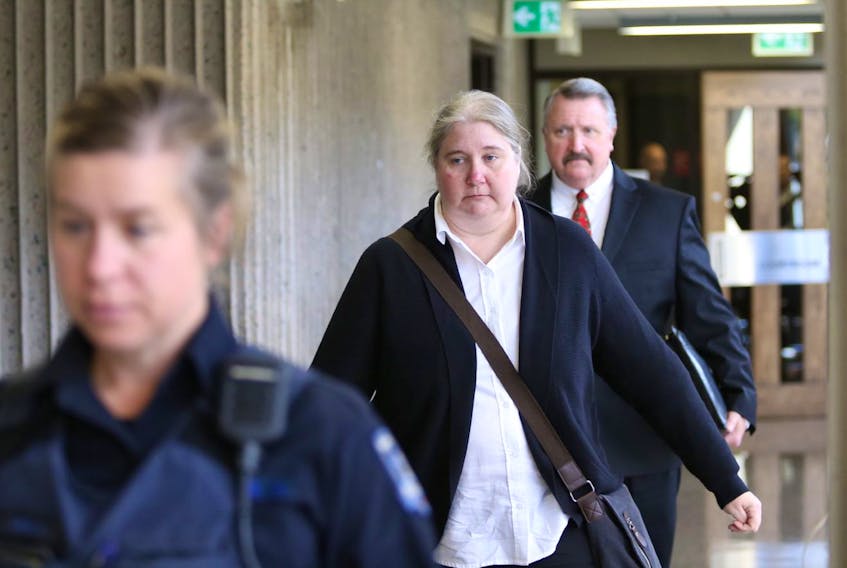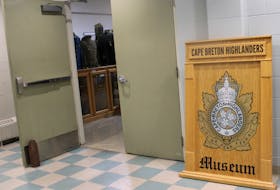Special Constable Cheryl Gardner told a jury that no one gave her any instruction on the risks of leaving a spit hood in place before an intoxicated man died in a jail cell where she was the booking officer.
Gardner took the stand in her own defence on Wednesday in her trial on charges of criminal negligence causing the death of Corey Rogers. Fellow booking officer Dan Fraser is also on trial for the same charge. Fraser testified on Tuesday.
Rogers was arrested outside the IWK children's hospital the night of June 15, 2016. Arresting officer Const. Ryan Morris testified last week that he saw Rogers down a half pint of Fireball whiskey before being taken into custody and that Rogers began spitting inside the Halifax Regional Police cruiser taking him to the Gottingen Street HQ.
Gardner told the court she held the door while constables Ryan Morris, Justin Murphy and Donna Paris carried Rogers into the booking area, placed him on the floor and searched him. The officers had already placed a spit hood on Rogers to prevent him from spitting or otherwise getting body fluids on anyone else.
Gardner, who is now 47 and works with the Quartermaster Store for HRP, testified that she attempted to assess Rogers for his medical fitness but he didn't answer her questions. She said the police officers told her Rogers was “playing possum,” with passive resistance and would not answer her questions.
On her forms, she wrote “too intoxicated to answer,” but it was her assessment, based on the information the police provided and her past experience with Rogers, who had been arrested and booked multiple times for intoxication, that he was OK to be placed in a cell.
She testified that while video evidence has shown Rogers to appear incoherent and unable to get to his feet, it was nothing she had not seen from him in the past.
“He had been arrested many times before for being drunk,” Gardner said.
“There was nothing out of the ordinary that I hadn't experience with him before. His behaviour and actions were what I had experienced so I didn't see any kind of indication of distress.”
Attorney Ron Pizzo, who is handling her defence, had her relate to the jury how she conducted cell checks on Rogers every 15 minutes. She said she went to the door of the “dry cell,” which has no furniture that a prisoner could fall off of, and spoke to him, watching to see if he responded or appeared in distress. She testified that she heard him moan at one point and saw that he appeared to be breathing when she did her checks.
Gardner said she felt it would be better to let Rogers sleep it off than try to wake him up every 15 minutes, as is mandated in department policy.
She also told the court staffing levels and the risk of violence to booking officers made it difficult to follow the procedures.
Crown attorney Chris Vanderhooft, in his cross-examination, pressured her on her assessment that Rogers was fit to enter the cells instead of requiring medical attention from EHS.
Vanderhooft also suggested she knew of the risk of harm from leaving the spit hood in place.
“No,” she said. “Because we never were warned of any danger of leaving a spit hood on, so that's why were never removed them.”
In his turn to question Gardner, David Bright, the attorney for Fraser, asked her to clarify the lack of instruction on use of spit hoods.
“Here we have management issuing things to booking officers that may be dangerous,” Bright said. “There's no training, there's no instructions, there's nothing, there's just 'here's a box of spit hoods, away you go,' is that true?”
“Yes, that's essentially what happened,” she replied.
Rogers died sometime in the period just before midnight and 1:30 a.m. after choking on his own vomit, which he was unable to clear from his airways.
Wednesday afternoon, Pizzo called veteran booking officer Stephan Longtin to the stand, under the Crown's objection on the grounds he had no notice he would be called.
Justice Kevin Coady allowed the witness to testify.
Longtin is the senior-most booking officer with HRP, in his 18th year in that role. He testified about the realities of the job versus the policies management wanted performed.
“No booking officer does a full Four-R check every check,” Longtin testified. “None of them.”
He said booking officers do not enter cells except at the start and end of shifts because at that point there are two officers available to ensure safety.
Longtin was the final witness called for the trial and Pizzo closed his case after his testimony.
The lawyers are expected to give final arguments Thursday morning.









